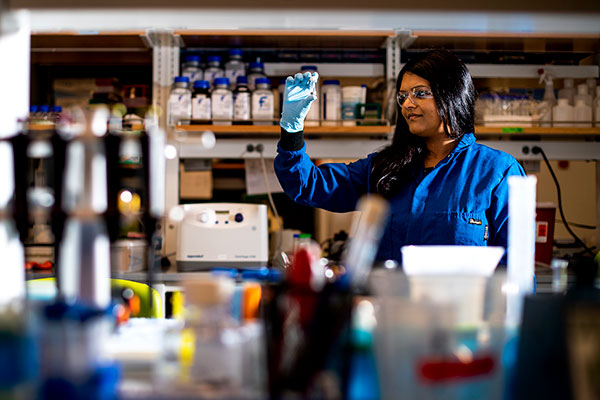Developing Electrically Charged Biomaterials for Drug Delivery

BioE Assistant Professor Ambika Bajpayee, in collaboration with Ryan Porter from the University of Arkansas for Medical Sciences, was awarded a $2.2M grant from the National Institute of Arthritis and Musculoskeletal and Skin Diseases for “Intra-Cartilage Depot Delivery of Electrically-Charged IL-1RA for Targeting Osteoarthritis-Associated Inflammation and Catabolism in Multiple Joint Tissues”.
Abstract Source: NIH
Despite the existence of promising osteoarthritis (OA) drugs, its treatment remains a challenge due to ineffective drug delivery systems. Intra-articular (IA) delivery is inadequate as drugs rapidly clear out from joint space and are unable to penetrate through the dense, negatively charged cartilage and reach their cell and matrix target sites at optimal concentrations. As a result, no disease modifying OA drugs (DMOADs) have passed clinical trials due to concerns of systemic toxicity and lack of cartilage targeting. For effective treatment, it is critical to stimulate a disease modifying biological response within multiple joint tissues, including cartilage, synovium and subchondral bone. Interleukin (IL)-1 receptor antagonist (IL-1RA) is proven to be a promising DMOAD for modulating both synovium inflammation and cartilage catabolism in preclinical models of post-traumatic (PT)OA; however, it has failed to show sustained clinical effect owing to lack of cartilage targeting and short joint residence time. The high negative charge density of cartilage provides a unique opportunity to use electrostatic interactions for enhancing uptake, depth of penetration, and retention of cationic drugs or drug carriers. We have shown that the cationic glycoprotein Avidin, owing to its optimal size and charge, was effective for intra-cartilage delivery as it rapidly penetrated through full thickness of cartilage in rats and rabbits following IA injection, resulting in 400- fold higher intra-cartilage uptake compared to its neutral counterpart and was retained inside cartilage for 3-4 weeks. Based on Avidin’s structure, we have designed a Cationic Peptide Carrier (CPC) that displayed similarly high uptake in both normal and glycosaminoglycan-depleted cartilage. This project will develop electrically charged IL-1RA by conjugating it with Avidin and CPC to make it cartilage penetrating and binding, thus increasing its tissue specificity and residence time. This way, cartilage can be converted from a barrier to drug entry into a drug depot, such that the anti-catabolic effects of charged IL-1RA in both cartilage and nearby synovium are significantly enhanced compared to unmodified IL-1RA. In Aim 1, Avidin-IL-1RA and CPC-IL-1RA will be characterized and their key transport properties (diffusivities, equilibrium uptakes, partitioning, binding constants) will be compared with unmodified IL-1RA in normal and arthritic cartilage. Aim 2 will evaluate the biological efficacy of a single dose of charged IL-1RA for inhibiting cytokine induced catabolism in a cartilage- synovium co-culture OA model, comparing Avidin/CPC-IL-1RA conjugates with single and continuous dose of unmodified IL-1RA. Aim 3 will determine the therapeutic potential of a single IA injection of charged IL-1RA relative to unmodified IL-1RA using a rabbit PTOA model. This work will advance the field of charge based drug delivery in targeting multiple joint tissues for effective, holistic OA treatment by applying fundamental concepts of bio-electrostatics and bio-transport. This charge-based platform can be used for delivering a wide range of drugs to other tissues with similar properties, such as meniscus, intervertebral disc and fracture callus, and also enable clinical translation of various OA drugs that have failed clinical trials due to lack of tissue targeting.